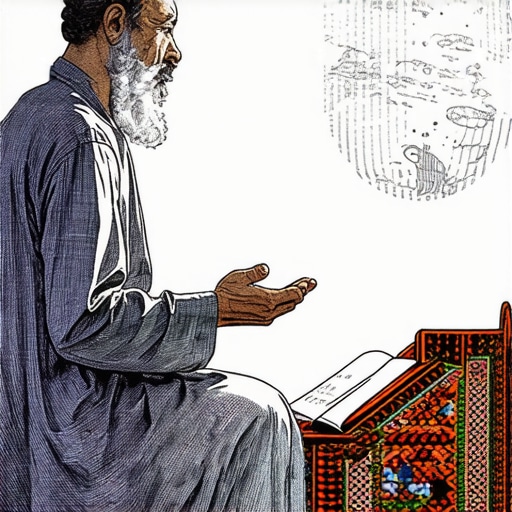Dreaming of Icons and Prophets: The Spiritual Significance in Islam
Ever woken up puzzled, wondering if that vivid dream about a famous personality holds a hidden message from the divine? In the world of Islamic dream interpretation, dreams are not just fleeting images but sacred messages—signs that can guide, warn, or inspire. Today, we dive into the fascinating realm of dreams featuring renowned personalities and what they symbolize in the spiritual landscape of Islam.
Why Do Dreaming of a Famous Person Matter? The Sacred Context
Islamic tradition regards dreams as a channel for divine communication, especially when they involve revered figures. Seeing a prophet, a scholar, or even a beloved personality in your sleep might be a reflection of your spiritual aspirations or a divine hint about your life’s path. But what does it really mean when the person appears in your dream? Is it a sign of divine favor or a call for self-reflection?
Could Dreaming of a Notorious Figure Be a Sacred Message or Just a Nighttime Fantasy?
It’s tempting to interpret dreams about celebrities or infamous figures as mere pop culture. Yet, in Islamic dream analysis, such visions often symbolize qualities we need to embody or warnings we should heed. For example, dreaming of a righteous prophet could signify spiritual purity, while encountering a corrupt politician might serve as a warning to stay vigilant against worldly temptations.
According to the classical Islamic scholar Ibn Sirin, dreams involving prominent personalities can symbolize divine messages about our personal virtues or vices. These dreams act as spiritual mirrors, reflecting our inner state and guiding us toward righteousness. For further insight, explore the detailed interpretations of dreams about influential figures in Islamic dream dictionaries.
How to Distinguish Divine Messages from the Mere Imagination?
One of the most intriguing aspects of Islamic dream interpretation is understanding whether a dream is a divine message or a fleeting illusion. Dreams of prophets or sacred personalities often come with a sense of tranquility and clarity, unlike random images that fade upon waking. Additionally, the timing of such dreams—especially those occurring before dawn—can be significant, as this period is considered especially auspicious for divine revelations. For more on this, visit dreams before Fajr.
What About Dreaming of a Saint or a Religious Scholar? More Than Just Respect
Dreams about Islamic scholars or saints are particularly meaningful. They may symbolize spiritual guidance, divine inspiration, or a reminder to pursue knowledge and piety. These visions can serve as sacred nudges to deepen your faith or seek out spiritual mentors. If you’re curious about interpreting such dreams, the dream interpretation guides can provide valuable insights.
Remember, in Islam, dreams are layered with meaning, and understanding them requires a nuanced approach—one that considers context, timing, and personal circumstances.
Join the Conversation: Have You Experienced Sacred Dreams?
If you’ve ever dreamt of a revered figure or encountered a divine sign, share your story! These experiences enrich our collective understanding and remind us of the sacred messages waiting in our dreams. Explore more about dream symbolism at dream meanings in Islam.
What Can Dreaming of a Revered Islamic Scholar Reveal About Your Spiritual Journey?
Dreams involving esteemed scholars, saints, or prophets are often seen as sacred messages, guiding us toward spiritual growth and deeper faith. When you encounter such figures in your sleep, it’s natural to wonder: is this a divine sign or merely a reflection of your subconscious? Islamic dream interpretation emphasizes that these visions are layered with meaning, often symbolizing divine guidance, encouragement to seek knowledge, or a reminder to strengthen your piety.
For instance, dreaming of a well-known Islamic scholar might not just be an admiration of their knowledge but could symbolize a call to pursue sincere learning and spiritual enlightenment. Such dreams can serve as gentle nudges to attend religious classes, read sacred texts, or even seek mentorship from a learned individual. The sacredness of these dreams is underlined in Islamic dream dictionaries, which explore how visions of saints or scholars often reflect inner aspirations and divine messages.
Is Your Dream a Sacred Message or a Reflection of Your Inner Desires?
This question strikes at the core of Islamic dream analysis. Dreams involving revered figures can sometimes be misinterpreted as mere wishful thinking, yet traditional scholars like Ibn Sirin highlight their spiritual significance. Such dreams might indicate that your soul is seeking guidance or that divine wisdom is being conveyed through symbolic imagery. Clarity in interpretation often depends on the dream’s context, your emotional state during sleep, and the specific details within the vision.
Moreover, the timing of these dreams plays a vital role. Dreams occurring before dawn—known as dreams before Fajr—are believed to carry more divine weight, offering insights that are both profound and timely. To deepen your understanding, explore dreams before Fajr, which are considered especially auspicious for receiving divine messages.
How Can We Differentiate Between Divine Guidance and Our Own Imagination?
Distinguishing sacred dreams from mere mental images requires a nuanced approach. Dreams of prophets or esteemed scholars often evoke feelings of tranquility, clarity, and spiritual elevation. If your dream leaves you with a sense of divine presence or inspiration, it likely bears spiritual significance. Conversely, dreams that cause confusion or anxiety may need further reflection or consultation with knowledgeable scholars. Understanding these distinctions is crucial for accurate interpretation and spiritual growth.
In addition, dreams about saints or revered personalities are not only about personal reflection but can also serve as divine encouragement to act righteously. Engaging with trusted Islamic scholars or using reputable dream interpretation guides helps to decode these sacred messages, ensuring you align your actions with divine guidance.
Share Your Sacred Dream Experiences and Enrich Our Collective Wisdom
Have you ever experienced a dream involving a beloved Islamic scholar or prophet? Such moments are precious and can offer valuable insights into your spiritual state. Sharing your experiences not only fosters community but also helps others recognize the divine messages embedded in their dreams. For more insights on interpreting sacred dreams, visit dreams about marriage and sacred signs that might hold spiritual lessons for you.
Decoding the Sacred Symbols: How Islamic Dream Interpretation Offers Profound Spiritual Guidance
In the rich tapestry of Islamic spirituality, dreams serve as a divine conduit—an intimate channel through which Allah communicates with His servants. Unlike superficial nocturnal images, these visions often carry layered meanings, requiring keen discernment and scholarly insight to interpret correctly. As experts in Islamic theology and dream analysis, we delve into the nuanced art of understanding sacred dreams involving revered figures, and how these visions can profoundly influence your spiritual journey.
The Esoteric Language of Dreams: Why Dreams of Prophets, Saints, and Scholars Are Sacred
Dreams featuring prophets, saints, or prominent Islamic scholars are not mere reflections of subconscious admiration but are often considered direct divine messages. These visions can serve as spiritual nudges, urging believers toward piety, knowledge, or righteous action. According to classical Islamic scholars like Ibn Sirin, such dreams symbolize divine encouragement or warnings, with their interpretations rooted in context, emotional tone, and spiritual state during sleep.
For instance, dreaming of Prophet Muhammad (peace be upon him) may symbolize a desire for spiritual closeness or an indication to follow his teachings more diligently. Conversely, visions of a corrupt scholar might highlight areas where the believer needs spiritual purification or caution.
What is the significance of dreaming about revered Islamic figures compared to ordinary personalities?
This question often arises among devout Muslims seeking clarity. While dreams of ordinary people might reflect personal aspirations or fears, dreams involving revered figures are generally viewed as divine messages, especially if accompanied by feelings of serenity and clarity. The distinctiveness stems from the belief that such visions are imbued with divine wisdom, especially when they occur during auspicious times, such as before Fajr—the pre-dawn prayer period considered ripe for divine revelations.
To deepen your understanding, consult authoritative sources such as Islamic Dream Interpretation which offers detailed classifications of sacred dreams and their spiritual implications.
Distinguishing Divine Guidance from Subconscious Imagination: Expert Techniques
One of the most intricate aspects of Islamic dream analysis is discerning whether a vision is a divine message or a product of subconscious imagination. Experts recommend paying close attention to the emotional and physical sensations experienced during the dream. Divine messages often evoke tranquility, inspiration, and a sense of divine presence, whereas illusions may induce confusion, fear, or anxiety.
Furthermore, the timing of the dream plays a crucial role; dreams occurring before Fajr tend to carry more spiritual weight, aligning with the Islamic tradition that the pre-dawn hours are especially conducive to divine communication. Practical methods include maintaining a dream journal, consulting knowledgeable scholars, and cross-referencing dreams with Quranic teachings or prophetic traditions for verification.
It’s also beneficial to understand the concept of Ruh al-Quds (the sacred spirit), which is believed to transmit divine guidance through dreams. Recognizing authentic divine messages often requires spiritual purification and sincere supplication to Allah to clarify the dream’s meaning.
Engaging with Experts: How to Seek Accurate Interpretation and Spiritual Advice
Given the complexity and layered symbolism of sacred dreams, consulting with reputable Islamic scholars or qualified dream interpreters is highly recommended. Many Islamic centers offer dream interpretation workshops guided by scholars well-versed in hadith and Islamic jurisprudence. Engaging in spiritual practices such as prayer, dhikr, and reading Quran can also enhance one’s receptivity to divine messages.
Remember, dreams are not just personal visions but are intertwined with the divine plan. If you experience a sacred dream, approach it with humility, seek knowledge, and remain committed to your spiritual growth.
Share Your Sacred Dream Experiences and Enrich Our Collective Understanding
Have you encountered a divine vision involving a prophet or saint? Your insights can inspire others and foster a deeper appreciation of the sacred art of dream interpretation. To explore further, visit Islamic Dream Interpretation Resources for comprehensive guidance and community stories that illuminate the spiritual significance of dreams.

Unveiling the Hidden Layers: How Dreams of Prophets and Saints Illuminate Your Spiritual Path
In Islamic tradition, dreams involving revered prophets, saints, and scholars are often regarded as profound divine messages rather than mere subconscious reveries. These visions serve as spiritual signposts, guiding believers toward righteousness, deeper knowledge, and closer communion with Allah. But how can one distinguish authentic divine guidance from personal imagination or wishful thinking? Expert Islamic dream scholars emphasize that the context, emotional tone, and timing of such dreams are crucial indicators of their sacred nature.
For instance, dreams of Prophet Muhammad (peace be upon him) are considered among the most significant, often symbolizing a call to increase devotion or to embody his exemplary character. Similarly, visions of saints or righteous scholars may serve as divine encouragement to pursue knowledge or seek spiritual mentorship. According to classical Islamic scholars like Ibn Sirin, these dreams are layered with symbolism rooted in the Quran and prophetic traditions, offering believers personalized guidance aligned with divine will. For a detailed exploration of dream symbolism, consult the Islamic dream dictionary.
What Is the Significance of Dreaming About Revered Islamic Figures Compared to Ordinary Personalities?
This question often arises among devout Muslims striving to interpret their visions accurately. While dreams of ordinary individuals may reflect personal aspirations or fears, dreams involving prophets or saints are traditionally viewed as divine messages, especially when accompanied by feelings of serenity and clarity. Such visions are believed to carry messages of divine encouragement or warnings, often occurring during auspicious times like the pre-dawn hours, known as Fajr. These times are considered spiritually potent for receiving divine revelations, as supported by Islamic teachings. To deepen your understanding, explore dreams about sacred figures in Islam.
Expert scholars recommend maintaining a dream journal and seeking guidance from qualified Islamic interpreters to decode these sacred messages accurately. Recognizing the divine essence in such dreams requires a sincere heart, spiritual purity, and ongoing prayer for clarity.
How Can We Differentiate Between Divine Guidance and Our Own Imagination in Dreams?
This is arguably one of the most nuanced aspects of Islamic dream interpretation. According to Islamic scholars, divine messages often evoke feelings of tranquility, inspiration, and a sense of divine presence that lingers after waking. Conversely, illusions or fantasies tend to cause confusion, fear, or anxiety. Paying attention to the emotional and physical sensations during the dream can be revealing. Additionally, dreams occurring before Fajr are often considered more spiritually significant, as this period aligns with divine communication. To refine your discernment, consider reading dreams before Fajr.
Engaging in sincere supplication (dua), regular prayer, and seeking knowledge from reputable scholars further enhances one’s ability to interpret dreams correctly. Remember, Allah guides whom He wills, and sincere effort in understanding dreams aligns with divine approval.
What Are Practical Steps to Seek Accurate Interpretation and Spiritual Advice?
Given the layered symbolism within sacred dreams, consulting reputable Islamic scholars or dream interpreters remains essential. Many Islamic centers offer workshops and guidance rooted in prophetic traditions and Quranic teachings. Additionally, maintaining a consistent spiritual practice—reading Quran, engaging in dhikr, and praying—can elevate receptivity to divine messages. For comprehensive guidance, visit contact our Islamic dream interpretation experts.
Ultimately, approaching sacred dreams with humility, patience, and faith transforms these visions into invaluable tools for spiritual growth, aligning your heart with divine wisdom.
Share Your Sacred Dream Experiences and Inspire Our Community
Have you encountered a divine vision involving a prophet, saint, or scholar? Your experience can inspire others and foster a richer understanding of the sacred art of dream interpretation. Sharing stories helps build a community rooted in faith and divine guidance. For more insights and community stories, explore dreams about marriage and sacred signs.

Expert Insights & Advanced Considerations
1. The Significance of Timing in Sacred Dreams
Scholars emphasize that the timing of dreaming about revered Islamic figures, especially before Fajr, enhances the likelihood of divine messages. This period is considered spiritually potent, and dreams occurring during this time often carry deeper prophetic meanings and guidance.
2. Emotional and Physical Sensations as Clues
Authentic divine dreams typically evoke tranquility and inspiration, whereas dreams driven by subconscious desires may induce confusion or anxiety. Paying close attention to these sensations helps distinguish divine guidance from mere subconscious imagery.
3. The Role of Personal Spiritual State
One’s spiritual purity, sincerity, and ongoing devotion influence dream interpretation. Regular prayer, dhikr, and Quran recitation can elevate receptivity to divine messages, making dreams more vivid and meaningful.
4. The Importance of Expert Consultation
Engaging with qualified Islamic scholars or reputable dream interpreters ensures accurate understanding of sacred dreams. Resources like Islamic dream dictionaries provide valuable insights for deeper comprehension.
5. The Symbolic Nature of Revered Figures in Dreams
Visions of prophets or saints often symbolize divine encouragement, guidance, or warnings. These dreams serve as spiritual signposts, urging believers toward righteousness, knowledge, and piety, especially when accompanied by feelings of serenity and clarity.
Curated Expert Resources
- Islamic Dream Dictionaries: A comprehensive resource that offers detailed interpretations of dreams involving sacred figures, symbols, and events, rooted in Quranic and prophetic traditions.
- Scholarly Publications on Dream Interpretation: Books and articles by renowned scholars like Ibn Sirin and Al-Nabulsi that delve into the spiritual significance of dreams and how to interpret them accurately.
- Islamic Centers and Dream Interpretation Workshops: Local and online programs led by qualified scholars providing guidance on recognizing authentic divine messages in dreams.
- Quran and Hadith Resources: The primary texts that serve as foundational references for understanding the symbolism and significance of dreams involving prophets and saints.
Final Expert Perspective
In exploring sacred dreams involving revered Islamic figures, experts highlight the nuanced interplay of timing, emotional clarity, and spiritual readiness. Recognizing these divine messages requires a blend of scholarly knowledge, personal sincerity, and spiritual purification. As you deepen your understanding, remember that these visions are sacred channels for divine guidance, often layered with profound symbolism. Engaging with trusted sources and qualified scholars enhances your capacity to decode these messages accurately, ultimately enriching your spiritual journey. To further your mastery in this sacred art, consider sharing your experiences or consulting reputable Islamic dream interpretation resources—your insights can illuminate the divine path for others on their spiritual quest.



This article offers a profound insight into the significance of dreaming about revered Islamic figures. I’ve personally experienced a vivid dream where I saw a respected scholar during the pre-dawn hours, and it left a lasting impact—prompting me to seek more Islamic knowledge and deepen my faith. It made me wonder, how can we better prepare ourselves spiritually to receive and interpret these divine messages accurately? Are there specific practices or routines that enhance the clarity of such dreams? I believe maintaining sincerity, regular Quran recitation, and heartfelt supplication are key. Also, I find that journaling these dreams immediately upon waking helps in noticing patterns and understanding their layered meanings. For those of you who have had similar experiences, how do you differentiate between divine guidance and subconscious imagination? Exploring reliable dream dictionaries and seeking scholars’ guidance always seems wise, but personal intuition plays a significant role too. I’d love to hear from others who have experienced sacred dreams and how they approached their interpretation.